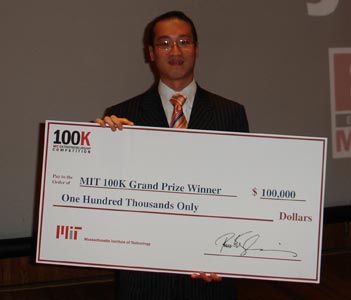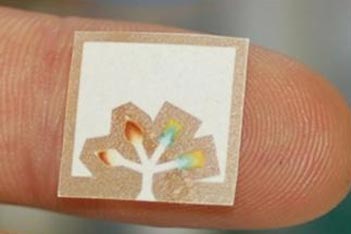Cardiac Resident Made History as Harvard and MIT Business Plan Team Winner

Gilbert Tang, MIT 100K Team Winner
|
Gilbert Tang (CardSurg), a June 2008 MBA graduate of the Harvard Business School
(HBS), made history with his business plan team, Diagnostics For All (DFA), as the
first ever winner of both the HBS and MIT business plan contests. The team consists
of 6 Harvard and MIT students, including Gilbert.
The business plan contests at HBS and MIT are hallmark venues for budding entrepreneurs
to enter their ideas to compete for attention and funding from venture capitalists.
Many past contest winners have become successful companies, several of which are
now worth billions of dollars.
This year's winner was chosen from among 18 contestants at HBS and 232 contestants
at MIT. What made Gilbert's team special was this was the first ever non-profit
entry that won the MIT contest. The HBS prize consists of $10,000 cash and $10,000
inkind services, while the coveted MIT prize consists of $100,000 in cash. Gilbert's
winning team was featured in the Boston Globe. ( http://www.boston.com/business/ticker/ 2008/05/mit_100k_compet.html)
DFA, a start-up non-profit enterprise, was co-founded by Dr. Hayat Sindi, a research
scholar who worked with the esteemed Harvard Professor of Chemistry George Whitesides
(http://gmwgroup.harvard.edu/research.html).
The company aims to provide a new generation of point-of-care diagnostic tools to
transform health management in the global health community.
|
Gilbert describes the project: "The initial application of our platform technology
is to perform LFTs on patients on medications for TB & HIV/AIDS in the developing
world. Currently, no active monitoring programs are in place and even if there are
it takes weeks to get results back and by that time that patient is gone and cannot
be tracked. This would have never happened in Canada or the US. As a result, one
million patients can die from drug-induced liver failure from the side effects of
these medications.
The product is based on a platform paper-based technology using microfluidics that
can simultaneously perform different biochemical reactions on a piece of paper to
give semi-quantitative lab results (think of a urine dip stick). Our LFT devices
will measure serum liver enzyme levels in 60 seconds by putting a drop of blood
on a piece of paper. The blood wicks through multiple channels, each containing
a separate reagent that changes colour upon reaction. The colour change matches
a semi-quantitative scale which allows field clinicians to make treatment decisions
on the spot, preventing liver damage from even happening in the first place. The
device is as small as a stamp and costs a penny to make. It enables health providers
in the field to get lab results in minutes and transform the way health monitoring
is done in developing countries.
In the future, we plan to expand monitoring to kidney function (e.g. creatinine,
BUN), electrolytes, hemoglobin, and even glucose & cholesterol for the developed
world. Future applications include paediatrics, emergency response, bioterrorism,
consumes and water testing. In fact, Unilever and J&J have already expressed interest
in licensing our technology for commercial use, and licensing revenues will sustain
our non-profit operations."
Gilbert will resume his cardiac surgery residency in July. He will also continue
to oversee DFA's operations to ensure the team's success translates to real social
impact.

DFA Device
|
|